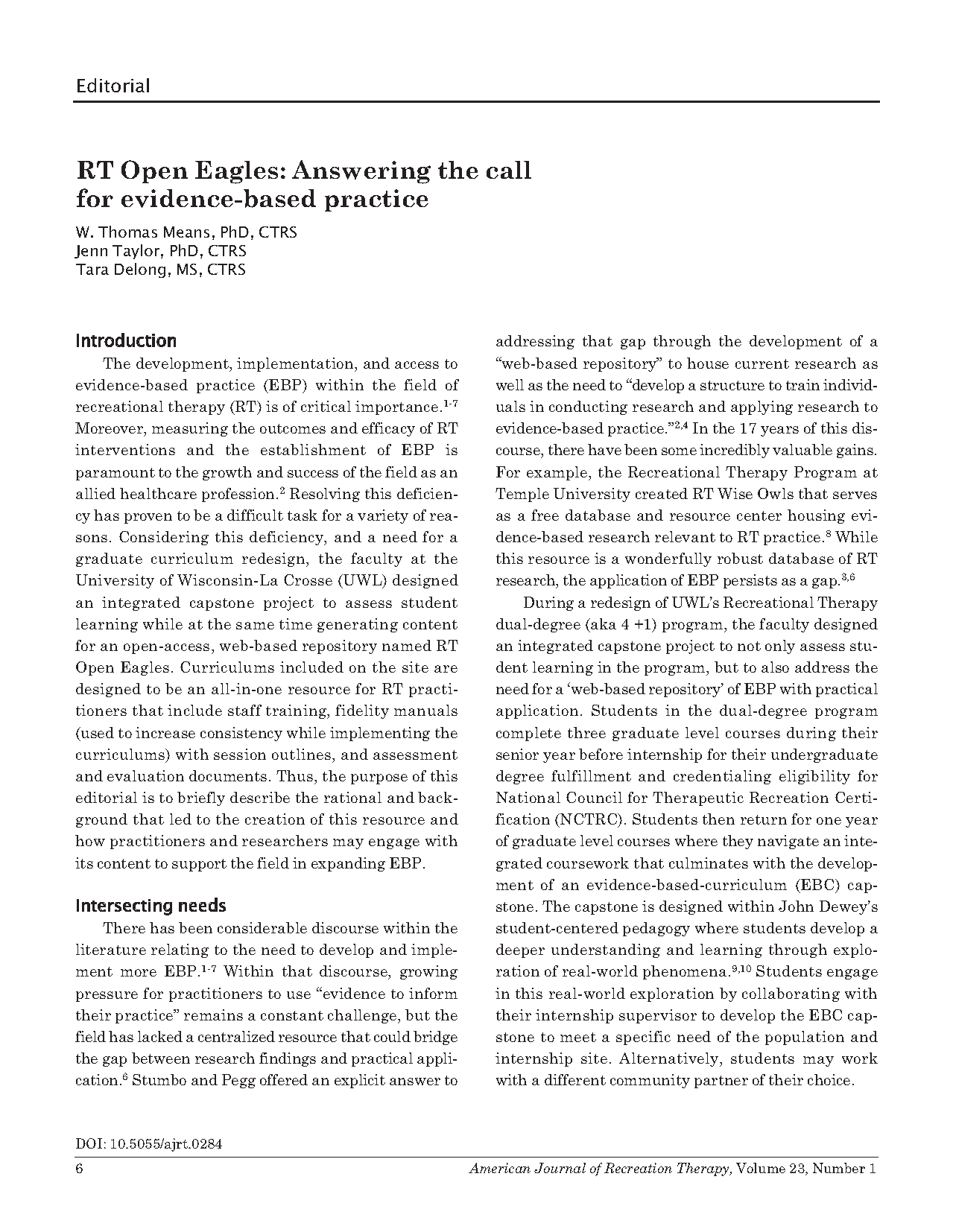RT Open Eagles: Answering the call for evidence-based practice
DOI:
https://doi.org/10.5055/ajrt.0284Keywords:
evidence-based practice, recreational therapy, RT Open EaglesAbstract
The development, implementation, and access to evidence-based practice (EBP) within the field of recreational therapy (RT) is of critical importance. Moreover, measuring the outcomes and efficacy of RT interventions and the establishment of EBP is paramount to the growth and success of the field as an allied healthcare profession. Resolving this deficiency has proven to be a difficult task for a variety of reasons. Considering this deficiency, and a need for a graduate curriculum redesign, the faculty at the University of Wisconsin-La Crosse (UWL) designed an integrated capstone project to assess student learning while at the same time generating content for an open-access, web-based repository named RT Open Eagles.
References
Mullen EJ: Choosing outcome measures in systematic reviews: Critical challenges. Research on Social Work Practice. 2006; 16(1): 84-90.
Stumbo NJ, Pegg S: Outcomes and evidence-based practice: Moving forward. Annual in Therapeutic Recreation. 2010; 18: 12-23.
Mrkic L: The prevalence of evidence-based practice by the Certified Therapeutic Recreation Specialist in the intervention planning process for client treatment. [Doctoral dissertation]. Richmond, KY: Eastern Kentucky University, 2011.
Negley S: The responsibility of higher education and practitioners in enhancing evidence-based recreational therapy practice. Annual in Therapeutic Recreation. 2013; 21, 1–2.
Lowe-Heisted M, Adams D, Giesbrecht M, et al.: Investing in practice infrastructure influences practice progress. Internet Journal of Allied Health Sciences and Practice. 2014; 12(1): 7.
Steffen AP, Reid CJ: Evidence-based practice in therapeutic recreation: An examination of clinical decision-making in mental health. Therapeutic Recreation Journal. 2017; 51(1): 18-34.
Toms SB: Research in recreational therapy practice. Therapeutic Recreation Journal. 2019; 53(4), 381-401.
Porter HR: RT wise owls: A recreational therapy website for evidence-based practice resources and tools. Therapeutic Recreation Journal. 2014; 48(4): 332.
Dewey J: Experience and Education. New York: The MacMillian Company, 1938.
Bell S: Project-based learning for the 21st century: Skills for the future. The clearing house. 2012; 83(2): 39-43.
Edel EP, Means WT: Mindfully strong evidence-based curriculum: A therapeutic recreation concept design. American Journal of Recreation Therapy. 2022; 21(2): 42-48.
Doughty A, Taylor J, Eldridge LA: Development of an evidence-based telehealth curriculum to increase happiness for older adults in long-term care: A therapeutic recreation concept design. American Journal of Recreation Therapy. 2023; 22(1): 39-47.

Published
How to Cite
Issue
Section
License
Copyright 2000-2025, Weston Medical Publishing, LLC and American Journal of Recreation Therapy. All Rights Reserved.

